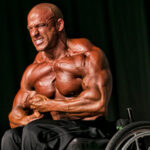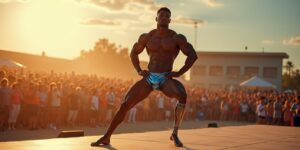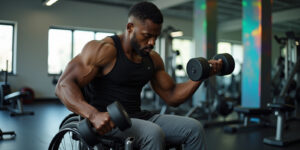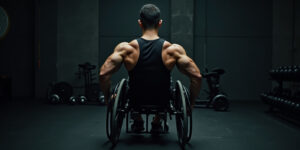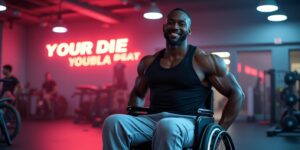People with disabilities face discrimination in society. Often, people are not comfortable around people with disabilities. This discomfort leads to labelling them as ‘disabled’ and treating them differently.
When it comes to bodybuilding, the sport of pushing one’s body to its physical limits, the barriers increase manifold. When one is disabled and pursues bodybuilding, the obstacles are even more immense. While most people shy away from working out with such individuals, some of them have succeeded in breaking the stigma around disability and bodybuilding. Read about such inspirational individuals who have broken barriers and stereotypes in this blog on disabled bodybuilding.
What is disabled bodybuilding?
Disabled bodybuilding is a type of competitive bodybuilding that is designed for people with disabilities. It is an empowering sport that focuses on strength, endurance, and physical ability, rather than the limitations imposed by disabilities.
In disabled bodybuilding competitions, participants are judged on their overall muscular development, symmetry, and definition, just like traditional bodybuilding competitions. However, the judging criteria may be adjusted based on the individual’s disability and the challenges they face in training and building muscle.
Disabled bodybuilding athletes may have a wide range of disabilities, including amputations, spinal cord injuries, cerebral palsy, and more. These athletes train just as hard as traditional bodybuilders, but they may need to modify their training programs to accommodate their disabilities. For example, an athlete with a lower limb amputation may need to focus more on upper body strength and use adaptive equipment to perform certain exercises.

One of the goals of disabled bodybuilding is to promote inclusivity and show that people with disabilities can achieve remarkable physical feats. Many athletes who compete in disabled bodybuilding say that it has improved their confidence, mental health, and overall quality of life.
Disabled bodybuilding competitions are often held alongside traditional bodybuilding competitions, providing an opportunity for disabled athletes to showcase their abilities and break down stereotypes about disability. There are also several organizations dedicated to promoting disabled bodybuilding, such as the International Federation of Bodybuilding and Fitness (IFBB) Disabled Division.
Disabled bodybuilding is a growing sport that is designed to showcase the physical abilities of people with disabilities. It promotes inclusivity and empowers athletes to reach their full potential, regardless of any limitations imposed by their disabilities.
Stigmas and misconceptions surrounding disabled bodybuilding
The sport of bodybuilding is often associated with images of extreme physical strength and capabilities, with people seeing the stereotype of the ‘perfect bodybuilder’ as someone who is able-bodied, muscular and naturally gifted in terms of their ability to build muscle mass. This image of the ‘ideal bodybuilder’ can sometimes lead to a sense of unfairness and a feeling of not belonging within the sport.
Despite this, there is an increasing diversity of bodybuilders across diverse backgrounds and abilities. Disabled bodybuilders are no different from their able-bodied counterparts in terms of their dedication and passion for the sport. Many have dedicated years to perfecting their craft and undergoing extensive training regiments that help them reach their goals. This has led to an increase in representation among disabled bodybuilders in competitive events, which has helped break down stigmas surrounding the abilities and achievements of disabled bodybuilders.

Disabled bodybuilders who have achieved success
Disabled bodybuilders who have achieved success have defied odds and pushed beyond limits to reach their goals. Through hard work, dedication, and perseverance, these athletes have proven that disability does not have to limit a person’s ability to achieve greatness. Here are some examples of disabled bodybuilders who have achieved success:
- Nick Scott: Nick Scott is a wheelchair-bound bodybuilder who has won numerous competitions, including the NPC Wheelchair Nationals and the WABBA Mr. Universe. Despite being paralyzed from the waist down, Nick has developed an impressive physique and has inspired others with his determination and passion for bodybuilding.
- Tony Torres: Tony Torres is a bodybuilder who lost his leg in a motorcycle accident. Despite this setback, Tony has continued to compete and has won several competitions, including the NPC Arizona Open and the IFBB Tampa Pro. He is also a motivational speaker who encourages others to pursue their dreams despite any obstacles they may face.
- Adelfo Cerame Jr.: Adelfo Cerame Jr. is a bodybuilder who was born with a clubfoot and underwent multiple surgeries as a child. Despite these challenges, Adelfo has become a successful bodybuilder and has won several competitions, including the NPC National Championships and the IFBB North American Championships. He is also a fitness coach and motivational speaker who inspires others to overcome their own obstacles and achieve their goals.
- Chris Nikic: Chris Nikic is the first person with Down syndrome to complete a full Ironman triathlon. He has also become a bodybuilder, working with a trainer to build strength and muscle mass. Chris’s accomplishments have inspired many, and he continues to push himself to new heights.
- Peter Molnar: Peter Molnar is a bodybuilder who lost his leg in a motorcycle accident. Despite this setback, Peter has continued to compete and has won several competitions, including the IFBB World Championships. He is also a fitness coach and motivational speaker who encourages others to pursue their dreams and overcome any obstacles they may face.
These disabled bodybuilders have achieved success through hard work, dedication, and a refusal to let their disabilities define them. They serve as powerful examples of what can be accomplished with determination and a positive attitude.
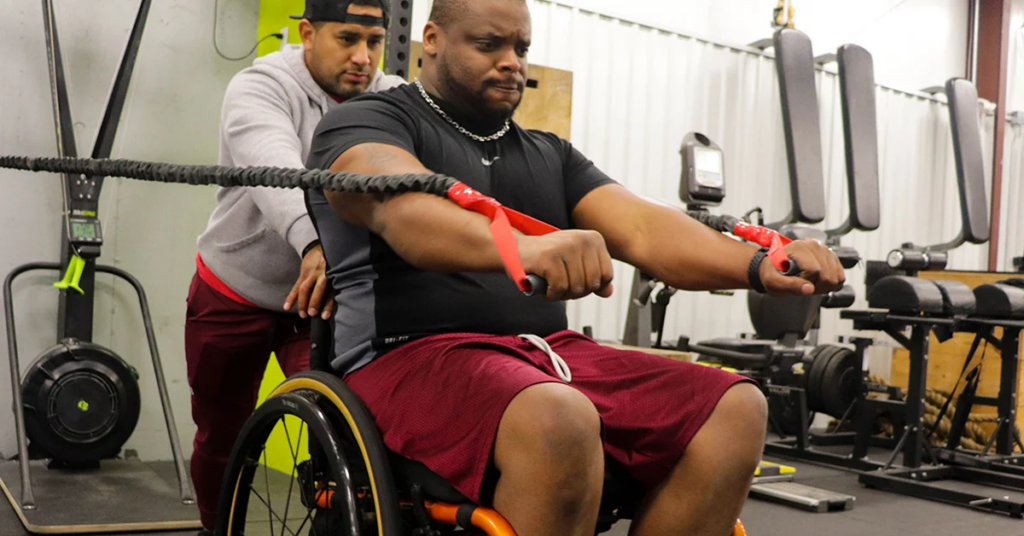
How to get started with disabled bodybuilding?
Getting started with disabled bodybuilding can be a great way to improve your strength, mobility, and overall health. Here are some tips to help you get started:
- Consult with a doctor or physical therapist: Before beginning any new exercise program, it is important to consult with a doctor or physical therapist who can help you determine what exercises are safe and appropriate for your individual needs and abilities.
- Find a qualified trainer: Look for a qualified trainer who has experience working with disabled athletes. They can help you develop a customized workout plan that takes into account your specific needs and limitations.
- Choose the right equipment: Depending on your disability, you may need specialized equipment such as a wheelchair-accessible weight bench, resistance bands, or adaptive exercise machines. Make sure you choose equipment that is safe and appropriate for your needs.
- Start slowly and gradually increase intensity: It is important to start slowly and gradually increase the intensity and duration of your workouts over time. This will help prevent injury and ensure that your body has time to adapt to the new demands you are placing on it.
- Focus on proper form and technique: Proper form and technique are essential for preventing injury and getting the most out of your workouts. Make sure you work with a trainer who can help you develop proper form and technique for each exercise.
- Incorporate a variety of exercises: Incorporating a variety of exercises can help prevent boredom and keep your workouts challenging. Be sure to include exercises that target all of the major muscle groups, including your legs, back, chest, arms, and core.
- Listen to your body: It is important to listen to your body and pay attention to any signs of pain or discomfort. If you experience pain or discomfort during a workout, stop immediately and consult with your trainer or doctor.
Getting started with disabled bodybuilding requires a combination of proper planning, qualified guidance, and a commitment to your own health and wellness. By following these tips, you can begin your journey towards building strength, improving your mobility, and achieving your fitness goals.
Different competitive platforms for disabled bodybuilders
There are many international competitive platforms available for disabled bodybuilders who are interested in showcasing their strength, dedication, and physique. Here are some of the popular ones:
- Wheelchair Bodybuilding: This platform caters specifically to individuals with spinal cord injuries or other mobility impairments that require the use of a wheelchair. The competitions include categories for both men and women and feature events such as bench press, deadlift, and seated rows.
- Special Olympics: The Special Olympics offers a variety of athletic events for individuals with intellectual disabilities, including powerlifting and bodybuilding. The competitions are designed to provide a safe and supportive environment for athletes to showcase their abilities.
- Paralympic Powerlifting: This platform is for athletes with physical disabilities who want to compete in powerlifting. The competition features three lifts: squat, bench press, and deadlift, and is divided into various categories based on the athlete’s weight and disability classification.
- Adaptive Strongman: This platform caters to individuals with physical disabilities, including amputees, wheelchair users, and those with prosthetic limbs. The competition includes events such as the log press, tire flip, and farmers walk.
- Wounded Warrior Project: This platform is designed specifically for wounded veterans who want to compete in bodybuilding and fitness competitions. The program provides training and support for veterans with physical and emotional injuries.
- International Federation of Bodybuilding and Fitness (IFBB) Physique America: This platform offers a wheelchair bodybuilding category that allows athletes with mobility impairments to showcase their physiques on stage. The competition is open to both men and women.
These competitions provide a supportive and inclusive environment for athletes to showcase their skills and abilities, and they offer an opportunity to inspire others to overcome their own challenges and reach their goals.
Breaking the stigma around disability and bodybuilding
Disabled bodybuilders are challenging societal stigmas and challenging expectations by showcasing their passion for the sport, their physical capabilities, and their quest for self-improvement. They are also breaking down barriers of access, representation, and participation in bodybuilding through advocacy efforts on social media.
Understanding the power of bodybuilding as a form of self-expression for people with disabilities can help advocates raise awareness of issues surrounding disability and bodybuilding. This can help create more inclusive environments that value difference and diversity regardless of limitations or abilities.
Let’s Sum Up
Bodybuilding is all about self-expression, self-confidence, and pushing yourself to be a better version of yourself. It’s about embracing who you are and learning to love yourself no matter what others say. We’re all special in our own way, and bodybuilding has the power to change your life for the better. No one should be told that they can’t bodybuild, as it is a form of self-expression. If you have a disability or are just starting out in bodybuilding, don’t focus on what others will say. Just go ahead and do it. After all, bodybuilding is all about self-expression!

